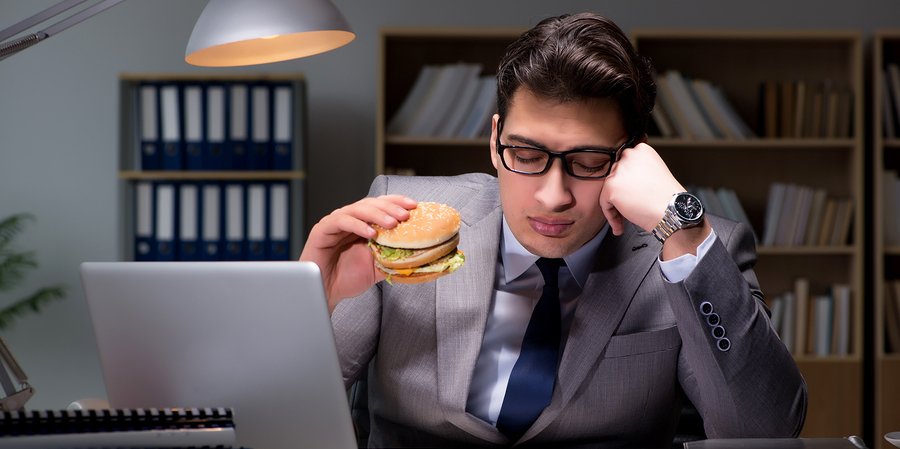In most households, the days of June and Ward Cleaver-style, nightly family dinners promptly at 6 p.m. are long gone. Most people work late, run errands, take the kids to and from their activities, and eventually put dinner on the table…at some point. And that often means a late meal, then collapsing into bed exhausted. But if that sounds like your typical schedule, you might want to rethink your evenings because new research suggests that dining so late could increase your cancer risk.
The study, which took place at the Barcelona Institute for Global Health in Spain, found that eating dinner at a late hour, as well as going to sleep soon after finishing dinner, is associated with a greater chance of developing either prostate or breast cancer.1 Kogevinas, Manolis; et al. “Effect of mistimed eating patterns on breast and prostate cancer risk (MCC-Spain Study).” International Journal of Cancer. 17 July 2018. Accessed 22 July 2018. http://onlinelibrary.wiley.com/doi/full/10.1002/ijc.31649. These results are based on an investigation that included 621 men with prostate cancer and a control group of 872 men without the disease, and 1,205 women with breast cancer and a control group of 1,321 women without the disease.
All the subjects answered questions that covered many lifestyle factors. They reported their typical eating habits, mealtimes, sleep patterns, tendency to be an early bird or night owl, physical activity level, and more. After analyzing the data that was generated, the researchers discovered that the timing of dinner and sleep were both important. The participants who ate dinner earlier than 9 p.m. or didn’t go to sleep until at least two hours after dining had a 20 percent lower risk of developing prostate or breast cancer compared to their peers who generally ate past 10 p.m. or went to bed shortly after finishing their meal.
It is not known from the information gathered whether other forms of late-night eating had an impact on cancer risk. Approximately seven percent of the volunteers admitted to indulging in snacks after dinner, but the study concentrated on full meals only, not snacking.
The research was not designed to prove cause and effect, but it does demonstrate a link between late suppers and a greater likelihood of developing prostate and breast cancer. While it is not clear exactly what mechanism is at work here, it may have to do with the influence of the body’s circadian rhythms, which control our sleep-wake cycles. In fact, a 2018 study at Sichuan University in China showed that working regular night shifts, which can disrupt the circadian rhythms, was associated with higher rates of cancer.2 Yuan, X.; et al. “Night Shift Work Increases the Risks of Multiple Primary Cancers in Women: A Systematic Review and Meta-analysis of 61 Articles.” Cancer Epidemiology, Biomarkers, and Prevention. January 2018. Accessed 23 July 2018. http://www.ncbi.nlm.nih.gov/pubmed/29311165.
It also may be difficult for the body to adequately digest a full meal too close to bedtime. And eating over a longer 15-hour stretch of the day—the equivalent of late night eating—was found in a 2014 study at the Salk Institute in La Jolla, California to be linked to more weight gain, even when the same quantity of food is consumed.
But what about all those European countries where dinner is regularly eaten well into the night? The difference may be that in those nations, people keep a later schedule in general so that although they eat later, they also go to sleep much later, and wake up later in the morning. In addition, there may be other factors at play as well, such as healthier, more nutritious food choices and greater levels of exercise in the evening that may burn off some of these calories and promote better digestion. But that said, keep in mind that the study was conducted at the Barcelona Institute for Global Health in Spain—Spain being one of those countries renowned for its late night eating.
Ultimately, there is really no downside to rescheduling your dinners a little earlier in the evening. It’s not like you have to be sitting down to the early-bird special at 5 p.m. to benefit—any time at least two hours before bedtime appears to help lower your risk of prostate and breast cancer. It might mean a slight adjustment of your priorities in the hours after work, but that goes back to taking care of yourself and leading a healthy lifestyle overall. And chances are good that you’ll find it feels much better to lay down to go to sleep several hours after eating than it ever did with a belly full of food.
References
| ↑1 | Kogevinas, Manolis; et al. “Effect of mistimed eating patterns on breast and prostate cancer risk (MCC-Spain Study).” International Journal of Cancer. 17 July 2018. Accessed 22 July 2018. http://onlinelibrary.wiley.com/doi/full/10.1002/ijc.31649. |
|---|---|
| ↑2 | Yuan, X.; et al. “Night Shift Work Increases the Risks of Multiple Primary Cancers in Women: A Systematic Review and Meta-analysis of 61 Articles.” Cancer Epidemiology, Biomarkers, and Prevention. January 2018. Accessed 23 July 2018. http://www.ncbi.nlm.nih.gov/pubmed/29311165. |











